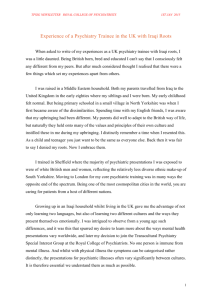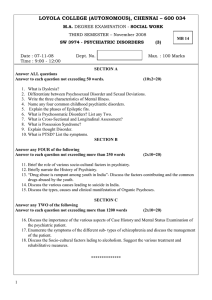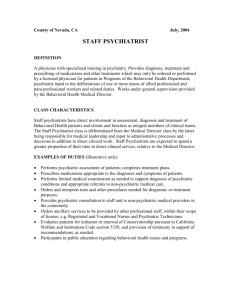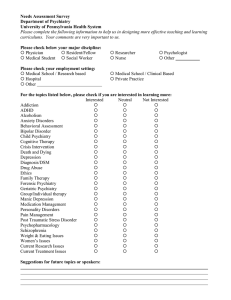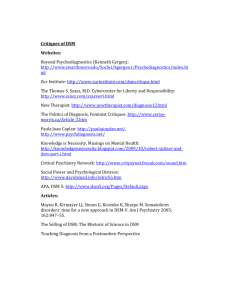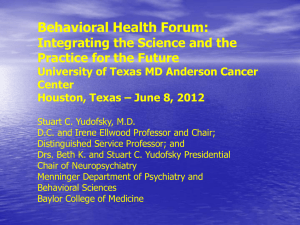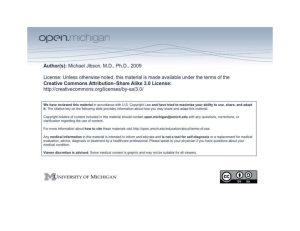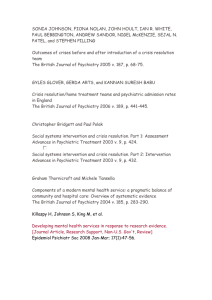Clinical Psychology Intro: Abnormality, Brain, Psychiatry
advertisement
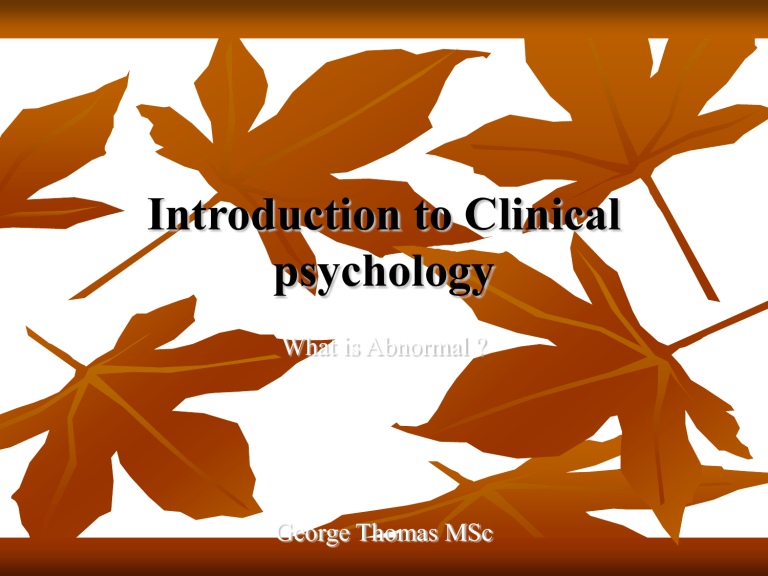
Introduction to Clinical psychology What is Abnormal ? George Thomas MSc THE BRAIN: AN INTERACTIONAL PERSPECTIVE Brain research helps us understand normal and abnormal behavior by Specifying how the brain grows and maintains itself. Identifying the mechanisms by which the brain acquires, stores, and uses information at the cellular and molecular levels, and at the level of behavior and social interaction. Explaining how the brain monitors and regulates internal bodily processes. Combining criteria None of the 4 criteria seem sufficient on their own. If you just take one criterion you can always find examples that agree, but then there are also always examples which do not fit So some combination of criteria is needed. Also the relative importance of each of the Κλικ για προσθήκη κειμένου criteria will vary depending on the kind of disorder you are looking at FACTORS THAT INFLUENCE VULNERABILITY TO BRAIN DISORDERS Age – Infant brain more susceptible to pathological conditions Social support – Presence of caring people eases adjustment to brain conditions Stress – The greater the stress, the greater the cognitive and behavioral deficits will be Personality factors – Some react with intense anxiety, paranoia, defensiveness to brain conditions Physical condition – Site of disorder, rate of onset, duration of disorder, and general health influence the clinical picture. ASSESSING BRAIN DAMAGE Mental status examination Information about current behavior and thought including orientation to reality, memory, and ability to follow instructions Neuropsychological testing Assess impairment in awareness of and responsiveness to sensory stimulation, ability to understand verbal communication, and ability in verbal and emotional expression Brain imaging Computerized tomography (CT scan) Positron emission tomography (PT scan) Magnetic resonance imaging (MRI) THREE MAJOR BRAIN SCANNING TECHNIQUES MENTAL STATUS EXAMINATION Time – “What year is this? What day?” Place – “What city and state are we in?” Immediate memory – “Repeat these words….” Attention – “Subtract 7 from 100 and continue to do so.” Recall – “Repeat the words I mentioned earlier.” Naming – “What is this?” (Show object) Repetition – “Repeat: East, west, home’s best.” Following command – “Put this watch on the table.” Visual construction – “Copy this figure.” Construction of psychiatric authority: The basis of psychiatry 'If mental illness did not exist, it would be necessary to inventκειμένου it.' Κλικ για προσθήκη (Szasz 1990, p526) ‘I dare not dwell on the absoluteness of being locked in, in case the panic which flutters around my heart and legs should rise and form a scream from which there is no rescue. Someone please take me home.’ (Patient from the BBC programme 'Over the Edge') Suggested reading: Note that few abnormal texts books cover this topic at all: Comer, R. (2000) Abnormal Psychology. 4th Ed. Page 446-7. Laing's ideas on the causes of schizophrenia. Gross, R. (1996) Psychology: The science of mind and behaviour. London: Hodder and Stoughton. An early section of the chapter on abnormal psychology describes Szasz's ideas. Web sites The Unofficial R. D. Laing website. General information on Laing. http://www.geocities.com/athens/olympus/5214/laing.html Advanced reading Szasz, T. (1994) Cruel compassion : psychiatric control of society's unwanted, New York; Chichester: Wiley [362.20422/SZA – 1 copy] Szasz, T. (1974) The myth of mental illness: foundations of a theory of personal conduct, New York : Harper & Row [616.89/SZA – 1 copy] Kotowicz, Z. (1997) R.D. Laing and the paths of antipsychiatry, London:Routledge [616.8909/LAI-KOT – 1 copy] Boyle, M. (1990) Schizophrenia: A scientific delusion? Routledge, London. Criticisms of Psychiatry Psychiatry tells a story of progress, i.e. better diagnosis, understanding of causes and treatment. Radical psychiatric approaches = challenged this story. negative effects of psychiatry challenges = referred to as ‘anti-psychiatry’, though leading radical psychiatrists would not accept this term Rare for (American) abnormal psychology textbooks to give more than a mention to this topic. Thomas Szasz In his preface to “The Myth of Mental Illness”, Szasz suggested that a more ethical science of human nature might be achievable. “I believe that psychiatry could be a science. I also believe that psychotherapy is an effective method of helping people – not to recover from an “illness”, it is true, but rather to learn about themselves, others, and life” (Szasz, 1974). Thomas Szasz Szasz looked at the social context of mental illness Feels that modern life is stressful and difficult, so some people have ‘problems in living’ i.e. fitting into society, and that these have real societal causes. Instead of dealing with these as real social problems, psychiatry covers them up by understanding them in medical terms. By doing so psychiatry is acting as a form of social control. Szasz attacked: The idea that mental illness was biological; and The practices of psychiatry. 1. Critique of biological basis of mental illness Psychiatrists assume mental illness is caused by diseases (biological disorders of the nervous system). If this is true, better to call them ‘diseases of the brain’ or ‘neurophysiological’ disorders This would remove any confusion between: Physical, organic defects which must be seen in an anatomical and physiological context ‘Problems of living’ within society which must be seen in a social context 1. Critique of biological basis of mental illness Psychiatrists acknowledge this distinction when they talk about organic vs. functional disorders. Szasz argues that most behaviours labelled as mental illness are actually social problems i.e. do not have a biological cause. e.g. most likely for disorders like the stress disorders (PTSD, ASD), dissociative disorders, somatoform disorders. For these disorders the explanations are psychological. So when we describe abnormal behaviour as mental illness i.e. diseased, we are using the term metaphorically. 1. Critique of biological basis of mental illness If we treat problems in living with biological interventions we introduce a logical inconsistency between the terms the problem is defined in and the treatment method. Szasz argues that it is logically absurd to expect medical interventions to help solve problems that have been defined in psychological (also ethical and legal) terms. Comparison Medicine Main tool of diagnosis = Signs (objective tests, e.g. X-rays) ways problems are understood = Biological Method of treatment = Biological Is there logical consistency between the terms in which the problem is understood and the treatment method ? = YES Psychiatry Main tool of diagnosis = Symptoms (the patients' reports such as saying that they believe they are Napoleon) Ways problems are understood = Psychological Method of treatment = Biological Is there logical consistency between the terms in which the problem is understood and the treatment method ? = NO 2. Critique of practices of psychiatry Szasz also offered a libertarian critique of the practices of psychiatry, especially involuntary committal. Argues that psychiatry serves a control and punishment function on behalf of society. When people upset the society’s social order by ignoring social laws and norms, society: Assigns them a stigmatising label e.g. criminal, mentally ill. Punishes them by commitment to a psychiatric institution and forces them to change in order to be let out. 2. Critique of practices of psychiatry Need for society to label peoples’ behaviour as mentally ill = driven by the need to understand and predict behaviour. People who are mentally ill are harder to predict and society finds this disturbing. Diagnosis represents a symbolic capture of the person, and hospitalisation / drugs etc. a physical capture. Psychiatric diagnoses are particularly stigmatising as they describe the whole person, someone does not have schizophrenia, but is schizophrenic. Psychiatry overemphasises its caring role and underacknowledges its control and punishment role, so a distorted relationship between psychiatry and the law. E.g. a mentally ill person commits a premeditated crime and then is acquitted by reason of insanity. 2. Critique of practices of psychiatry Szasz argues: that crimes do not cease to be criminal just because they have a psychotic motive When receiving a psychiatric label (from a supposedly caring institution) can be more of a punishment than receiving a criminal label (from a punishing institution). Mary Boyle Mary Boyle = Clinical Psychologist who has challenged the claim that psychiatric diagnosis is based upon scientific or secure specialist knowledge. Says the process of diagnosing psychiatric conditions is not a scientific, neutral, objective activity. Instead, she argues that: “nothing, especially psychiatric disorders, exists except as it is constructed in the minds of people” She vigorously disputes the claim by neurochemists, geneticists and molecular biologists that the diagnosis and causes of schizophrenia will eventually be improved and understood by scientific endeavours. Mary Boyle Boyle (1990) argues that psychiatric diagnosis and the relationship between science and diagnosis is a form of judicial and disciplinary power. ‘Disciplinary power’ = the power of professional disciplines (e.g. psychiatrists, psychologists, and psychiatric nurses). It works in a number of ways: ‘Disciplinary power’ 1. 2. Boyle argues that to construct a world that contains mental disorders suggests that it is reasonable, even necessary, to discover and describe these, and to identify those who are affected by them. The Diagnostic and Statistical Manual of Mental Disorders (DSM - IV), by producing categorises of “mental disorders” assumes a pre-existing category of object called a mental disorder. Rosenhan’s 1973 study (Being sane in insane places) Rosenhan’s (1973) famous study provides a particularly vivid example of madness being in the eye of the beholder and supports Boyle’s view that psychiatric diagnoses are unreliable. Rosenhan and seven other people who were not mentally ill arranged to be admitted as patients to different psychiatric hospitals. They all reported symptoms like “hearing voices saying “empty”, “hollow” or “thud”, but apart from using pseudonyms, gave their own personal histories and current circumstances to psychiatrists. They were all admitted and all except one were given a diagnosis of schizophrenia. Despite behaving completely normally and the other patients recognising their deception, none of the staff realised they were not mentally ill and interpreted their field note-taking as part of their diagnosis. Rosenhan and his colleagues found it extremely difficult to get discharged without admitting their deception and one person was discharged with a diagnosis of “schizophrenia in remission”, with staff never questioning the validity of the original diagnosis. disciplinary power 2. ‘disciplinary power’ = works by creating certain types of people who appear to exemplify natural categories of mental disorder, defining social norms of behaviour. The scientific and medical language to describe particular phenomena is another form of disciplinary power, because it makes certain forms of management seem desirable and appropriate, and effectively excludes people without scientific and medical training from challenging this way of viewing the world. Judicial power ‘Judicial power’ = the power of the state to legislate how people with mental illnesses are treated. Mental health legislation, which is dependent upon psychiatrists’ diagnostic ability, places psychiatrists in an unusually powerful position. Unlike formal law that is interpreted by barristers, judges, magistrates, juries, therapeutic law is operated by professionals and administrators, usually in private, because it is assumed they are better than the judiciary at interpreting mental health laws. Professionals are given discretion in the rules to interpret the law to take account of particular aspects of individual cases. Judicial power Whereas formal law has extensive provisions against wrongful operation (e.g. the initial assumption of innocence, stringent standards of proof, right to a defence or appeal), this is not considered necessary for therapeutic laws. Although the Mental Health Review Tribunal exists to review detention and discharge decisions, the procedures are less rigorous than required under formal law. Mental health legislation is supposed to act for the benefit and in the interests of its recipients. Assumed that the objectivity of scientific knowledge, and those who apply this knowledge, is a sufficient safeguard. Boyle’s key argument By attacking the scientific credibility that underpins the mental health legislation, Boyle (1990) threatens the very core of psychiatric authority. Psychiatrists have recognised that psychiatric diagnoses are unreliable, with clinicians frequently disagreeing on which diagnosis should be applied to particular people. To improve diagnostic reliability, clinicians have attempted to compile lists of criteria for each diagnostic category. Boyle’s key argument Essentially, Boyle (1990) argued that if the diagnostic labels were valid concepts, there should be no scientific need to search for reliable diagnostic criteria retrospectively. A concept or diagnosis (like schizophrenia), should only be inferred when researchers have identified a meaningful pattern of symptoms that become signs, which can later be studied to identify underlying disease processes. The concepts inferred during diagnosis, should come ready equipped with the criteria for inferring the diagnostic concept. If the concept does not have reliable criteria, Boyle argues that it should not have been brought into existence in the first place. So, having to look for criteria, after the concept has been brought into existence, is a reversal of the normal process of medical diagnosis.
